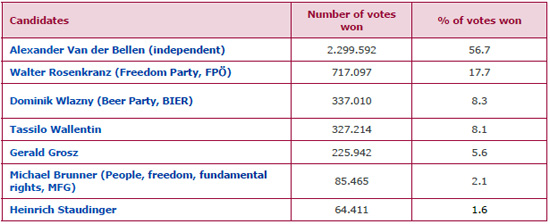Results
Elections in Europe
Corinne Deloy
-

Available versions :
EN

Corinne Deloy
Alexander Van der Bellen, the outgoing head of state, was re-elected as President of the Republic of Austria in the first round of voting on 9 October 2022 with 56.7% of the vote.
He beat Walter Rosenkranz (Freedom Party, FPÖ) and Ombudsman of the National Council (Nationalrat), the lower house of parliament, who won 17.7% of the vote. Dominik Wlazny, nicknamed Marco Pogo, leader of the punk band Turbobier (singer and guitarist) and leader of the Beer Party (BIER), came third with 8.3%. He was followed by the lawyer and writer Tassilo Wallentin 8.1%; Gerald Grosz, former chairman of the Alliance for the Future of Austria (BZÖ), 5.6%; Michael Brunner, chairman of the People, Freedom, Fundamental Rights (MFG), a party opposed to the Covid-19 vaccination, 2.1%; and entrepreneur Heinrich Staudinger, 1.6%.
Turnout was much lower than in the first round of the previous presidential election on 24 April 2016. It amounted to 52.50%, i.e. -16 points.
Results of the presidential election of 9 October 2022 in Austria
Turnout: 52.50%

Source : Home Affairs Ministry
"It would be good for Austria if we could get it right today. It would allow us to concentrate fully (...) on the multitude of crises we are facing in Europe," said outgoing head of state Alexander Van der Bellen after completing his civic duty in Vienna. He was granted his wish.
Alexander Van der Bellen was supported by the Social Democratic Party (SPÖ), the Greens (DG), his home party, and New Austria (NEOS). The People's Party (ÖVP) did not field a candidate against him but did not expressly support him, merely wishing him "all the best in this upcoming election".
Alexander Van der Bellen has had a turbulent first term in office with no less than five chancellors in the last six years. The head of state also has had to deal with the Covid-19 pandemic and the war in Ukraine. Austria is a neutral country: the country's perpetual neutrality - Immerwährende Neutralität Österreichs - has been enshrined in the constitution since 26 October 1955.
Popular with his compatriots, the outgoing president has been able to embody the stability that Austrians needed in these troubled times. He presented himself as "the only one who could avoid chaos" said political scientist Thomas Hofer, "a man of integrity" said Julia Partheymüller, researcher at the Centre for Electoral Research (VieCER) at the University of Vienna.
Walter Rosenkranz, little known to the general public, was dreaming of revenge after the previous presidential elections of 24 April and 4 December 2016, which had been a very close race between Alexander Van der Bellen and Norbert Hofer (FPÖ). However, the populist party has not recovered from the corruption scandals that led to Heinz-Christian Strache's resignation from the government and the leadership of his party in 2019.
"Alexander Van der Bellen has succeeded in securing his re-election in the first round of voting. I congratulate him on this," said Walter Rosenkranz after the results were announced.
Alexander Van der Bellen, 78, was born in Vienna. He comes from a Dutch family who settled in Russia and fled communism. He acquired Austrian citizenship in 1958 at the age of 14 (he was previously Estonian, in the Soviet Republic where his parents lived).
He graduated in economics from the University of Innsbruck and worked as an assistant at the Institute of Finance there and then at the International Institute for Management and Administration in Berlin. In 1976, he became a professor at the University of Innsbruck, then at the Federal Academy of Administration in Vienna and at the University of Vienna, where he was later appointed Dean of the Faculty of Economics and Social Sciences.
Initially a member of the Social Democratic Party (SPÖ), Alexander Van der Bellen later joined the Greens. He was elected Member of Parliament in 1994 and re-elected until 2012, when he resigned from the National Council. He was appointed spokesperson for the Greens in 1997, a position he held until 2008. On 4 December 2016, he became the first Austrian head of state from this political party.
Alexander Van der Bellen was thus re-elected with a higher result than the one he obtained in the 2nd round of the presidential election of 4 December 2016 (53.79%). "These are turbulent times: we are facing a difficult energy situation, the pandemic seems to be back and above all we have to deal with the war in Ukraine and its consequences. There is a lot to do. I therefore hope that we will find a form of alliance between the constructive forces of our Republic so that we can all work together to find solutions, because this collective approach has always proved its worth in Austria (...) It is now time to look ahead and tackle these daunting tasks," said the Head of State in his first speech after the confirmation of his victory.
On the same theme
To go further
Elections in Europe
Corinne Deloy
—
15 April 2025
Elections in Europe
Corinne Deloy
—
25 February 2025
Elections in Europe
Corinne Deloy
—
18 February 2025
Elections in Europe
Corinne Deloy
—
28 January 2025

The Letter
Schuman
European news of the week
Unique in its genre, with its 200,000 subscribers and its editions in 6 languages (French, English, German, Spanish, Polish and Ukrainian), it has brought to you, for 15 years, a summary of European news, more needed now than ever
Versions :



